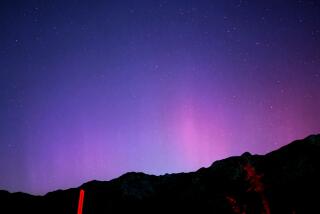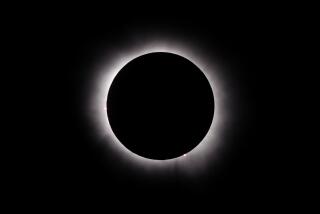S. America Eclipse Silences Animals, Thrills Observers
- Share via
PUTRE, Chile — Farm animals fell eerily silent but tourists and astronomers whooped with joy on arid Chilean hillsides Thursday as the moon blocked out the sun in the last total eclipse in the Southern Hemisphere this century.
Beamed on live television around the world, the eclipse thrilled visitors who came to the village of Putre from as far away as India, Japan and Britain to see the sun reduced for about three minutes to a flaming corona.
“It’s the most amazing natural phenomenon. Being high in the Andes made it really different,” said John Moss of California, viewing his sixth eclipse.
Roosters and donkeys fell silent and the air went cold as the sun disappeared, casting the hillsides in a murky twilight broken only by the flashes of thousands of cameras.
Jupiter, Venus and other celestial bodies popped into view in the suddenly darkened sky, then faded as the sun emerged from behind the moon.
The eclipse was visible in its totality in a narrow band across seven countries of South America stretching from the Peruvian Andes to the tropical coast of Brazil. The last total solar eclipse visible in the region was in 1966, and the next one won’t be until 2113.
A solar eclipse occurs when the moon obscures the sun as it comes between the sun and the Earth. This one began over the Pacific, 900 miles west of the South American continent.
The moon began blocking out the sun at 8:30 a.m. and completely obstructed the sun for two minutes and 58 seconds starting at 9:19 a.m.
Chile’s government issued health advisories warning people not to look at the eclipse without special eye filters. But in the capital, Santiago, where the eclipse was partial, people paid little heed to the warnings. Crowds gazed at the sun with only sunglasses or squinted into the sun with naked eyes--risking serious eye damage.
La Paz, Bolivia’s seat of government, came to a virtual standstill as schools, businesses and government offices shut down so people could watch.
The Bolivian government issued statements to reassure several religious sects that the eclipse did not mean the end of the world was approaching.
More to Read
Sign up for Essential California
The most important California stories and recommendations in your inbox every morning.
You may occasionally receive promotional content from the Los Angeles Times.













